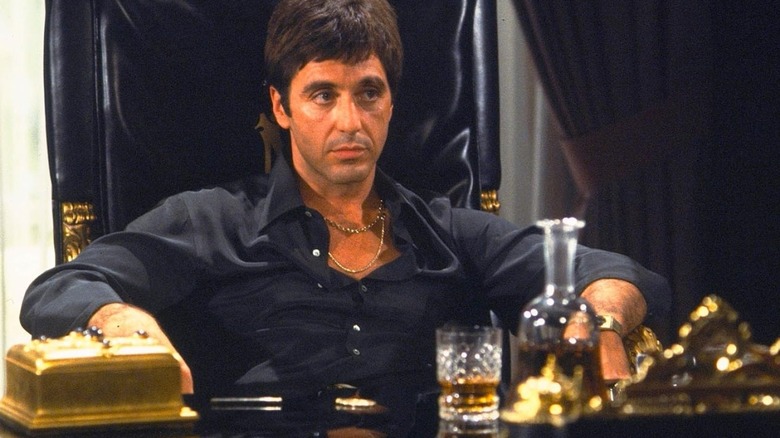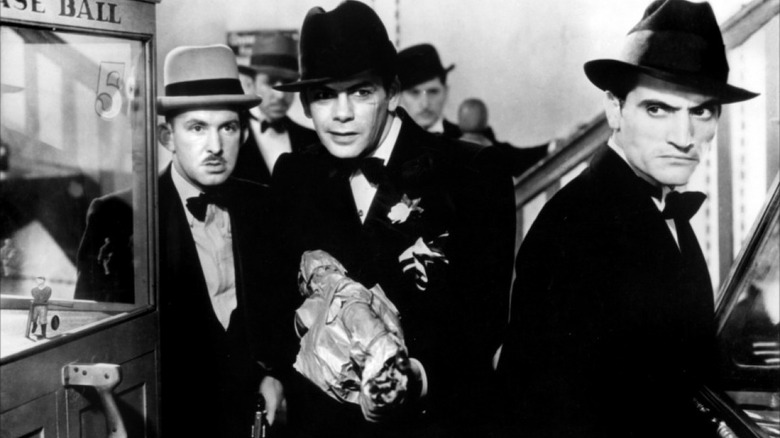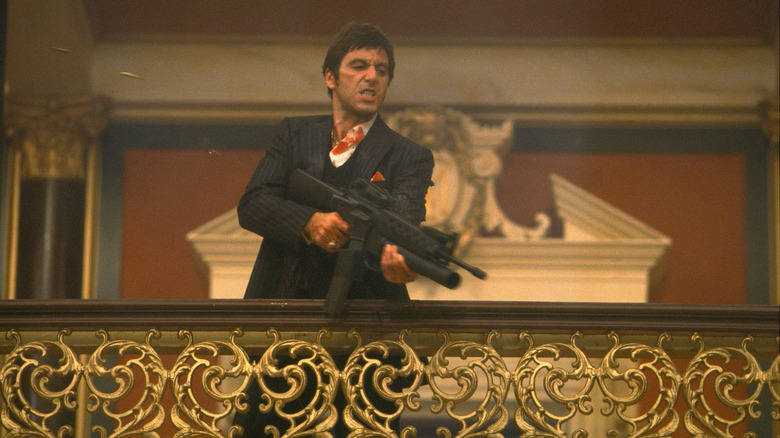David Ayer Talks About His Unmade Version Of Scarface, The Film That Got Away
Armitage Trail's original novel "Scarface" was first published in 1930, and traces the rise and fall of the vicious gangster Tony "Scarface" Guarino, who took over the Chicago bootlegging underground during Prohibition. Clearly, Tony Guarino is an analog to Al Capone, and many true crime fans find it tantalizingly suspicious that Armitage Trail (real name: Maurice R. Coons) died of a heart attack at age 28, only six months after the publication of "Scarface." Coons, after all, had to hobnob with real gangsters in order to get ideas for his novel, and he would have been known in certain corners of the underground.
In 1932, director Howard Hawks made the first film version of "Scarface," starring Paul Muni as Antonio "Tony" Camonte. Hawks' film was well-received, with some critics citing its naturalness and lack of melodrama. Indeed, it was so natural and treated crime with such frankness that some markets refused to show it (this was only shortly after the implementation of the infamous Hays Code, so Hollywood was feeling tetchy about cinema content).
Any naturalness instigated by Hawks was enthusiastically shed by Brian De Palma when he remade "Scarface" in 1983. In his film, Al Pacino played Tony Montana, a Cuban immigrant who, rather than taking over Prohibition-era Chicago, took over the cocaine-soaked beaches of Miami. Pacino gives one of the largest, most energetic performances in cinema history, coked to the gills and firing machine guns into ballrooms. Many aspiring criminals love De Palma's "Scarface."
/Film's Ben Pearson recently had the opportunity to sit down with filmmaker David Ayer ("End of Watch," "The Beekeeper"), and Ayer spoke of his sadly unmade version of "Scarface." Ayer's "Scarface" would have transposed the action to modern-day South Los Angeles. It was never picked up.
Scarface: Los Angeles
Ayer's first film as a credited screenwriter was attached to "U-571," a 2000 submarine thriller. He would explode in the public eye the following year with the release of Antoine Fuqua's "Training Day," which would earn its star, Denzel Washington, an Academy Award. He would also pen a few notable mainstream Hollywood pictures like "S.W.A.T." and "The Fast and the Furious" before taking up directing with gritty crime dramas like "Harsh Times" and "Street Kings."
More recently, Ayer moved into blockbusters with the infamously re-cut "Suicide Squad" and the Netflix fantasy thriller "Bright." Ayer specializes in a certain kind of smoky, sleazy ultra-noir, typically telling stories of corrupt cops and vicious killers, all fighting to stay alive and enriched in a world run by ego, money, and violence. It makes perfect sense, then, that he should be drawn to "Scarface." When asked about which unmade project of his he considered to be "the one that got away," Ayer replied:
"'Scarface,' for sure. 'Scarface.' I wrote an absolutely amazing script, and it's like anything: I want to be respectful of the studio and I want to give them the movie they want, and they want to be respectful of me as a director and have me make the movie I want, and it was probably better to part ways on that one, incredibly amicably and painfully. I still get asked about that script. 'Are you going to make it? Are you going to make it?' It's kind of like this underground script in Hollywood now."
From the sound of it, "Scarface" is not on the back burner any longer. It's simply not on the stove.
Say hello to my unmade friend
What was Ayer's angle going to be on "Scarface?" Like with his updates on the "The Fast and the Furious" script, he wanted to transpose the action to his hometown of South Central Los Angeles. Ayer, it should be noted, was born in Chicago and raised in Maryland and Minnesota before moving to South Central as a teenager. This would have been in the early-to-mid-1980s, right when cocaine was the popular drug du jour and the infamous so-called "crack epidemic" was on the upswing. There's too much about the crack epidemic to get into here, other than to say Ayer witnessed the police violence the "war on drugs" wrought. The filmmaker wanted his version of "Scarface" to recall that time. Ayer said:
"I think because I grew up in South L.A. and I grew up during the crack days and I saw so much of the violence myself, that some of that is kind of ingrained in the DNA of it, you know? The difference between having that lived experience in the real world and cinema lore and history, there's a delta. There's a gap. I'm always about reducing the gap."
Ayer's films tend to be overwrought and gritty to the point of being unpleasant. This is, of course, largely by design; he's not exactly a lightweight or "fun" filmmaker in the typical blockbuster sense. An ultra-gritty, David Ayer version of "Scarface" would have been a wonderful pairing of material and filmmaker. Sadly, as mentioned above, Ayer and the studio have parted ways on the project. Time will tell if it ever gets resurrected.


